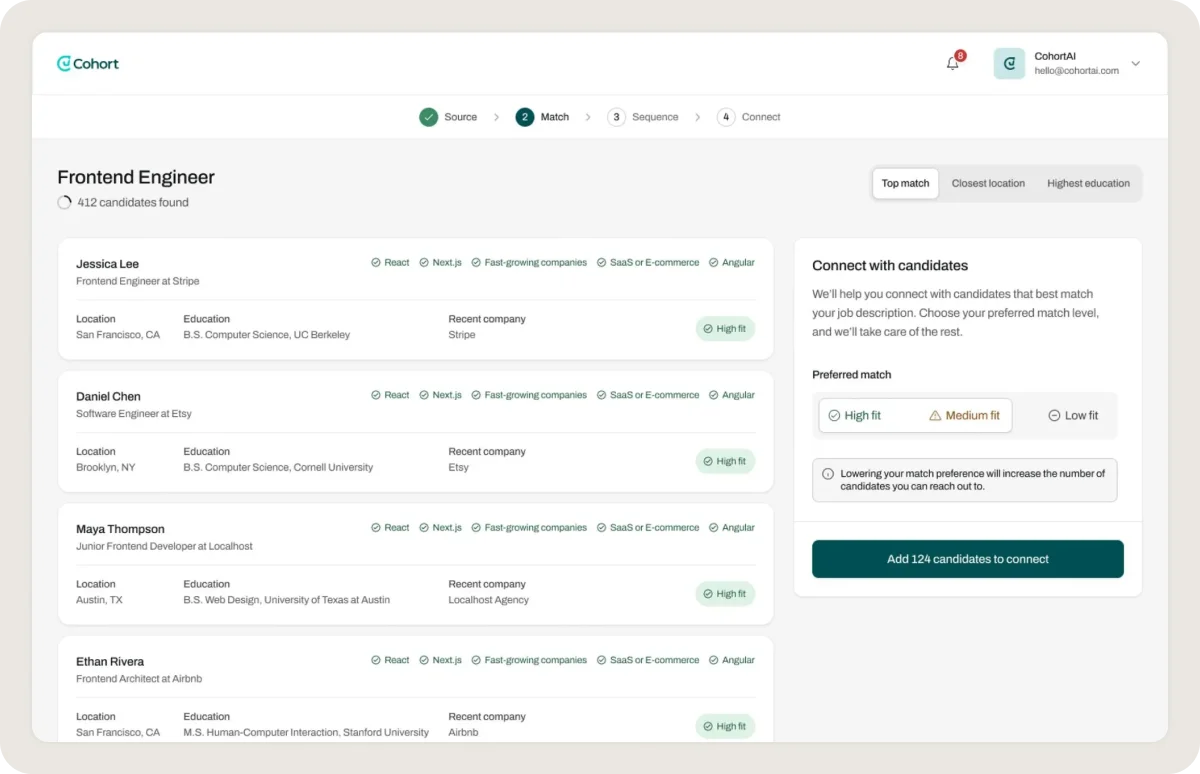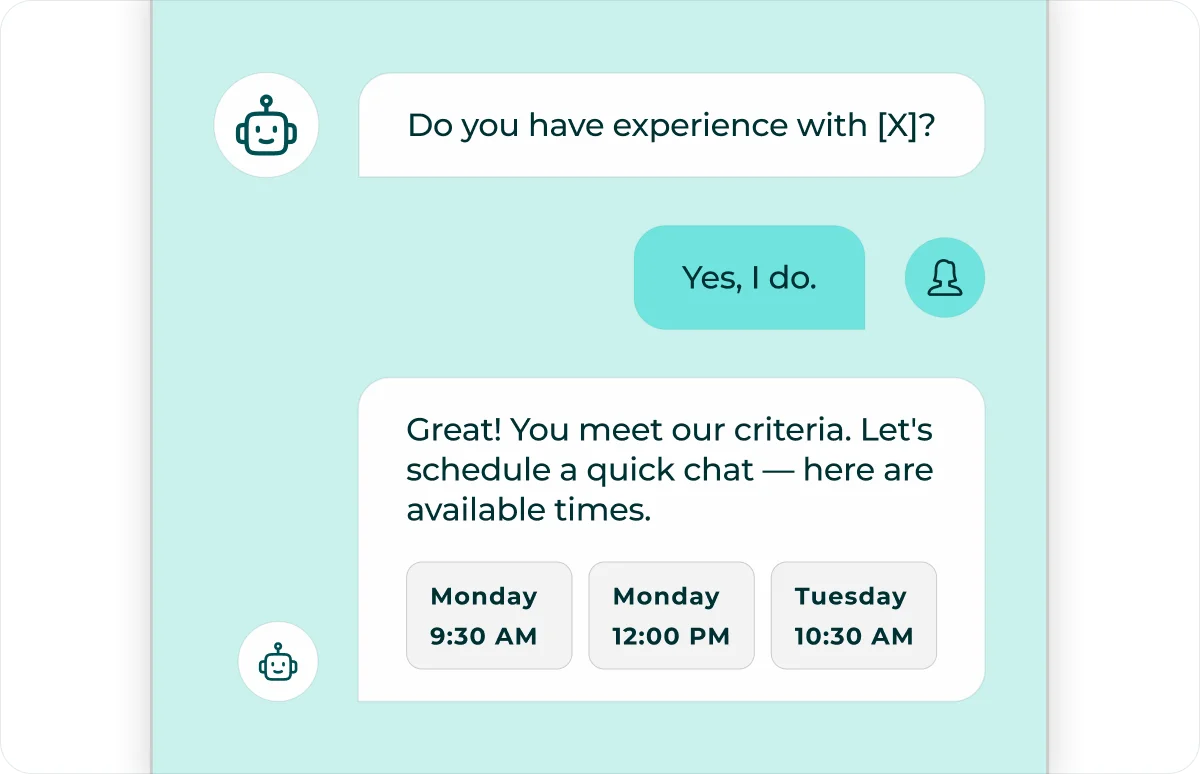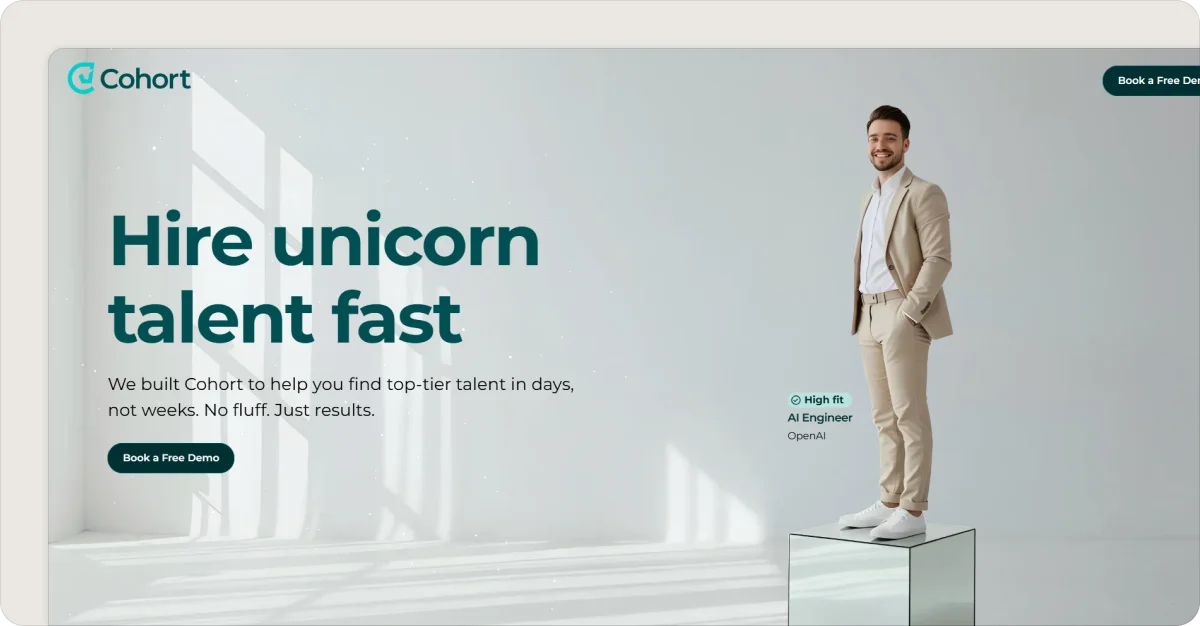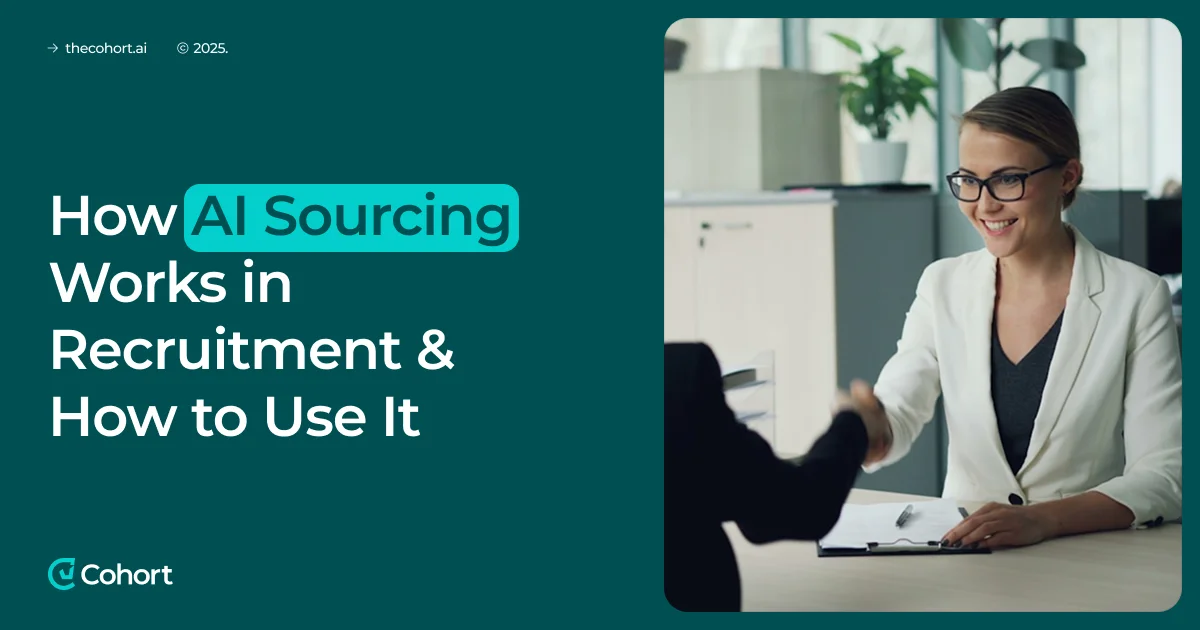Did you know that recruiters spend an average of 13 hours per week per role just sourcing candidates, often without finding the right ones?
With so much time spent on manual searches, it’s no surprise that many top candidates end up going unnoticed due to inefficient sourcing strategies.
That’s where AI-powered sourcing tools can make a real difference, streamlining the process and surfacing qualified talent with precision.
In this article, we’ll explore how AI sourcing works in recruitment and how you can use it to build a more effective hiring strategy.
Key Takeaways
- AI sourcing transforms how recruiters find talent
Artificial intelligence automates time-consuming tasks like resume screening and candidate matching, allowing recruiters to focus on relationship-building instead of manual searches. It quickly identifies qualified candidates based on skills, experience, and context.
- Recruiting becomes faster and more strategic
By automating search, filtering, and ranking, AI sourcing tools drastically reduce time-to-hire while freeing recruiters to focus on strategic priorities like candidate engagement and employer branding.
- Talent reach expands beyond traditional sources
AI can search across job boards, social media, and internal databases, uncovering candidates from diverse and nontraditional backgrounds. This broader reach helps organizations build stronger, more inclusive teams.
- Implementation requires planning and iteration
To succeed with AI sourcing, teams must set clear goals, pilot tools, train recruiters, and refine processes over time. Tracking KPIs like time-to-fill and quality-of-hire ensures measurable ROI and sustained adoption.
- Cohort AI streamlines sourcing end-to-end
Powered by generative AI and specialized talent agents, Cohort AI automates sourcing, screening, and engagement so recruiters can scale hiring without adding headcount. It delivers personalized outreach, smarter candidate matching, and continuously updated talent data, all while keeping the human touch.
What is AI sourcing?
AI sourcing is the use of artificial intelligence technologies to automate, streamline, and improve the process of finding and engaging potential job candidates.
Instead of recruiters manually searching through job boards, LinkedIn profiles, or databases, AI sourcing tools use machine learning and natural language processing (NLP) to:
- Scan large databases and resumes to identify candidates who match specific roles.
- Analyze hundreds of sources in seconds using algorithms and machine learning.
- Pinpoint top talent based on skills, experience, and hiring criteria.

Benefits of using AI tools for sourcing
Integrating AI into the recruitment sourcing stage offers a range of powerful advantages that help teams work faster, smarter, and more effectively. Here are some of the key benefits:
1. Increased efficiency and speed
AI sourcing tools automatically search, filter, and rank candidates, saving recruiters hours of manual work.
In fact, recruiters report that AI significantly accelerates hiring by streamlining tasks such as resume screening, reducing the time-to-hire by nearly 50%.
2. Better candidate quality
AI analyzes skills, experience, and past hiring data to identify top candidates that humans might overlook. As a result, 56% of recruiters using AI say it helps them find higher-quality candidates and improves overall hiring outcomes.
3. Reduced bias in screening
When properly designed, AI tools evaluate candidates based on objective criteria, such as skills and experience, rather than demographic factors. This data-driven approach helps minimize unconscious bias and supports more fair and diverse hiring decisions.
4. Cost savings
Automating repetitive sourcing tasks lowers recruitment costs by reducing the need for additional staff or external agencies. Teams report 20–40% lower cost-per-hire when AI automates screening + scheduling.
5. Expanded talent reach
AI can search across multiple sources, including job boards, social media, and internal databases, to find a wider range of candidates. This broader reach helps uncover talent from nontraditional backgrounds and strengthens workforce diversity.
6. Improved candidate experience
AI tools keep applicants informed and engaged with timely, personalized communication throughout the process. Features like chatbots and automated updates make the experience smoother and more transparent, creating a positive impression of the employer brand.
What parts of sourcing can you automate?
AI can enhance almost every stage of the talent sourcing process. Here are some of the key ways AI-powered tools are transforming sourcing:
1. Candidate matching & ranking
AI tools can quickly assess how well each applicant fits a specific role by analyzing their skills, experience, and qualifications. In fact, AI-assisted matching can increase the number of successful matches by 30% compared to traditional methods.
Instead of relying on simple keyword searches, these systems interpret context, related terms, and overall relevance to uncover strong candidates who might otherwise be overlooked.
✅ How it helps recruiters:
- Enhances accuracy: Finds qualified candidates even when their resumes use different terms or phrasing.
- Speeds up screening: Automatically ranks applicants so recruiters can focus on the strongest prospects first.
- Promotes fairness: Uses consistent, data-based criteria to reduce bias in the selection process.
💡 Pro tip
Even with advanced matching algorithms, recruiters often face the challenge of limited candidate pools. You can only rank what you can find, and that’s where most traditional sourcing methods fall short.
This is where Cohort’s AI Sally the Sourcer can help you.
Sally acts as your always-on talent scout, scanning millions of profiles across LinkedIn, GitHub, and other platforms to uncover top-tier candidates who align with your specific criteria.

By combining AI-driven matching with Sally’s proactive sourcing, you can go beyond keyword-based searches and surface exceptional talent that other recruiters miss.
👉 Ready to see Sally in action? Book a demo and get 3 perfect matches instantly!
2. Intelligent outreach & follow-up
AI also helps automate communication with candidates, making it easier for recruiters to scale their sourcing efforts. For example, an AI assistant can automatically send application confirmations, status updates, or interview invitations at the right time.
Recruiters can set up workflows so that when a candidate applies or reaches a specific stage in the process, they automatically receive a personalized email or text message.
Some tools even use AI to engage passive candidates by analyzing profiles and sending tailored outreach messages, helping recruiters connect with potential talent who may not be actively looking for new opportunities.
💡 Pro tip
Personalized, timely follow-ups are the secret to keeping top candidates engaged, but maintaining that level of communication manually is nearly impossible at scale.
With Cohort’s AI Pete the Prospector, you can turn cold leads into warm conversations automatically.
Pete acts as your dedicated outreach agent, crafting personalized messages based on candidate activity, history, and role alignment.
He keeps your outreach timely, relevant, and consistent, ensuring no promising candidate slips through the cracks.
3. Talent pool rediscovery
AI sourcing tools can mine existing candidate databases to rediscover past applicants. Instead of starting every search from scratch, AI organizes past candidates into talent pools by role or skill and surfaces those who fit new openings.
✅ How it helps recruiters:
- Maximizes existing talent: Unlocks the value of past applicants who already know your brand and expressed interest.
- Lowers sourcing costs: Decreases dependence on job boards and paid ads by leveraging your internal database.
- Strengthens candidate relationships: Re-engages previous applicants with new, relevant opportunities to maintain long-term connections.
4. Chatbot screening & scheduling
AI chatbots act as virtual recruiting assistants, handling early-stage interactions with candidates. They can chat on career sites or via text, ask screening questions, answer FAQs, and even schedule interviews by syncing with recruiters’ calendars.

✅ How it helps recruiters:
- Automates early screening: Efficiently filters candidates using predefined qualification questions, saving recruiters valuable time.
- Enhances candidate experience: Delivers instant, consistent communication and reduces waiting periods.
- Streamlines scheduling: Automatically coordinates interview times by syncing with recruiters’ calendars. Studies show that AI-driven scheduling can reduce interview coordination time by 60–80%.
📌 Important note
While AI can handle many of the repetitive, data-heavy parts of sourcing, it can’t replace what makes recruiting truly human. Emotional intelligence, cultural awareness, and ethical judgment still come from people, and that’s what keeps sourcing authentic and effective.
Here is what only humans can do and why it matters:
- Evaluate context and culture fit – AI can match on skills, but only humans can sense how someone will mesh with a team’s communication style, work rhythm, and company values.
- Build authentic relationships – Trust is at the heart of good recruiting. Candidates want to connect with real people, not just receive automated outreach or chatbot replies.
- Create inclusive experiences – AI can help reduce bias, but humans must define fairness, monitor outcomes, and ensure that every interaction reflects inclusion and respect.
- Interpret the “why” – Humans can uncover the motivations behind career moves, the passions that drive a candidate, and the aspirations that shape where they want to grow next.
- Navigate ambiguity – When roles shift or priorities conflict, AI alone can’t make the tough calls. Recruiters bring the judgment, empathy, and flexibility that software can’t replicate.
How to implement AI candidate sourcing
Successfully integrating AI into your recruitment process is not as straightforward as flipping a switch. It requires careful planning and clear steps to build an AI-enabled sourcing strategy that delivers real results.
Here are some AI sourcing strategies to keep in mind:
1. Define your needs and evaluate AI recruiting vendors
First thing you need to do is clarify exactly what you want the technology to achieve for your recruiting team. Clear goals help you choose tools that truly add value rather than overwhelm your process.
✅ How to make it work
- Identify your priorities: Decide what you want AI to do. Do you want to automate resume screening, source candidates online, or engage talent through chatbots.
- List key capabilities: Focus on the AI features that would create the biggest impact for your organization, such as smarter matching, predictive analytics, or automated communication.
- Evaluate cost and quality: Compare pricing, functionality, and user reviews to find the best fit for your budget and hiring goals.
- Check compliance and ethics: Ensure the solution offers transparency (explainable AI), fairness, and compliance with hiring regulations.
2. Set clear goals and KPIs
Before implementing AI, define exactly how you will measure success. Clear goals ensure everyone understands what outcomes the technology should deliver and help demonstrate its value to the organization.
✅ How to make it work
- Define measurable objectives: Decide what you want to achieve, such as reducing time-to-fill, improving quality of hire, or lowering cost-per-hire.
- Set specific KPIs: Establish concrete targets like cutting average time-to-fill from 40 days to 30 days or increasing candidate pipeline diversity by a set percentage.
- Track ROI: Use these KPIs to monitor progress and evaluate the return on your AI investment.
- Align your team: Share goals with leadership and recruiters so everyone understands what success with AI looks like and works toward the same outcomes.
3. Pilot, train, and iterate
Introducing AI into your recruiting process works best when done gradually. Starting small allows you to test the technology, build team confidence, and refine how it fits into your workflow before expanding its use.
✅ How to make it work
- Start with a pilot: Use the AI sourcing tool for one or two open positions while keeping your existing process for other roles as a comparison.
- Train your team: Offer hands-on training so recruiters understand how to use the software, interpret AI recommendations, and provide feedback.
- Encourage collaboration: Reinforce that AI supports decision-making rather than replacing it. Recruiters should still review AI-suggested candidates and flag any irrelevant recommendations to help the system improve.
- Expand gradually: Once the pilot shows positive results, roll out the AI more broadly across your sourcing workflows.
- Review and refine: Regularly analyze KPIs, gather recruiter feedback, and make adjustments to ensure the technology continues to add value and minimize potential issues like duplicate profiles or biased patterns.
Common challenges of AI sourcing
While AI can transform how organizations source talent, it also brings several important challenges and cautions to keep in mind:
🔴 Algorithmic bias
AI tools learn from past data, which means they can unintentionally repeat the same biases found in that data.
If previous hiring decisions were biased, the AI might favor or exclude certain candidates unfairly. Ongoing monitoring and bias checks are essential to ensure fair and equitable outcomes.
🔴 Loss of the human touch
Automation can make recruitment more efficient, but it can also make the process feel impersonal.
Candidates can usually tell when they are interacting with a machine, which may affect their perception of the company. Balancing AI efficiency with authentic human connection keeps the candidate experience positive.
🔴 Regulatory and compliance issues
Laws and guidelines around AI in hiring are still developing and vary by region. Companies must stay informed about changing regulations to ensure their AI systems remain ethical and compliant. Failing to do so can lead to legal or reputational risks.
🔴 ROI and implementation costs
AI systems can be expensive to adopt and require time, training, and integration. The benefits may not be immediately visible, especially for organizations with tight budgets.
Without clear goals and leadership support, AI sourcing efforts can lose momentum or fail to deliver results.
Automate your entire recruiting process with Cohort AI

Cohort AI integrates generative AI into everyday recruiting workflows, from sourcing and assessment to personalized engagement and matching, enabling hiring teams to recruit smarter, communicate more effectively, and scale their efforts without increasing headcount.
Powered by SPEC, our system of AI agents that manage sourcing, outreach, screening, and engagement, Cohort functions like a 24/7 talent operations team running seamlessly in the background.
Each search is supported by a dedicated Talent Architect, who captures the nuances of your requirements to deliver candidate recommendations that are accurate, relevant, and tailored to your organization
How Cohort AI helps you:
🟢 Smarter talent sourcing – Discover high-potential candidates by focusing on real skills and achievements, not just what’s on a résumé.
🟢 Simplified assessments – Conduct on-demand, role-specific interviews scored against clear success criteria for fair, consistent evaluations.
🟢 Personalized outreach – Send AI-tailored messages that reflect your brand voice and attract top talent.
🟢 Stronger engagement – Automate follow-ups and FAQs to keep candidates informed and reduce drop-offs.
🟢 Intelligent matching – Match candidates to roles based on skills, behaviors, and working styles, understanding how they work, not just where they’ve worked.
🟢 Talent graph + LLM matching layer – Builds a comprehensive candidate graph from both public and proprietary data, enabling intelligent matches based on patterns, potential, and context, not just keywords.
🟢 Talent data management – Continuously ingests, validates, and enriches candidate data from multiple sources to maintain a high-quality, up-to-date talent database.
Book a demo and see how Cohort’s AI-powered recruiting agents can deliver your top 3 candidates in under 72 hours.













